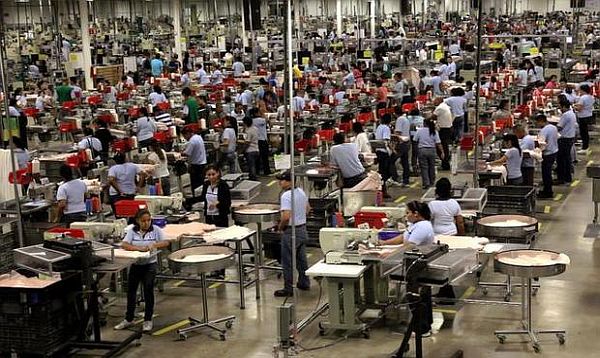Mexico City, Mexico — Mexico has the 14th largest economy in the world, a humming manufacturing sector, a newly opened energy sector that’s drawing worldwide interest and, at $144 a month, likely the lowest minimum wage in Latin America.
"It’s ridiculously low," said Jonathan Heath, an independent economist.
The wages that Mexican employers pay those on the lowest rung of the country’s $1.3 trillion economy have fueled a national debate this month, drawing demands by parties both to the left and right of the ruling PRI party to impose an increase.
It’s a debate that highlights the inequalities in Mexico – home to a tycoon who competes for the title of world’s richest man – and the struggles of a nation where more than half of workers toil outside the formal economy in gray areas, where a minimum wage is merely a theoretical notion.
Banging the drum for increasing the minimum wage is Mexico City Mayor Miguel Mancera, a leftist politician with a nose for higher office. Mancera claimed this month that the minimum wage has lost 77 percent of its purchasing power in the past 35 years, eroded by inflation.
"This means that in Mexico City, we can only acquire 23 percent of what we could buy in the 1970s," Mancera told a news conference on August 5th.
In a move to boost the fortunes of his Party of the Democratic Revolution, Mancera called on national legislators to raise the minimum wage next year from $67.3 pesos a day to between $80 and $87 pesos a day - $6.10 to $6.60 - enough to provide for what a government council that measures poverty says are the essentials for survival in daily food intake and transportation to and from work.
Labor Secretary Alfonso Navarrete Prida called the proposal dangerous, saying it could hobble economic growth, spark inflation, and stall efforts to increase productivity.
As it is now, Mexico’s minimum wage stands below nearly all countries in Latin America, including small economies of Central America. Panama sets a $640 monthly minimum wage. In Costa Rica it’s $492 and in Nicaragua, $166.
 |
"We are competing with Bolivia and Nicaragua," said Gerardo Esquivel, an economist with a Harvard Ph.D. who works at the Colegio de Mexico, a research and teaching institution.
The debate over the minimum wage has touched on Mexico’s Constitution – which guarantees a dignified salary – as well as everything from inflation to mortgages, which are pegged to the minimum wage in at least one subsidized federal program.
Article 123 of the Constitution, written in the aftermath of a revolution a century ago that enshrined the role of workers in the nation, says the minimum wage "shall be enough to fulfill normal family needs from a material, social, and cultural point of view."
"No one can seriously think that the minimum wage is OK," Heath said. "Either we change the Constitution and don’t do anything to the minimum wage, or we must increase the minimum wage."
About 6.6 million Mexicans in the 51.8 million labor force earn the minimum wage each month. Most of them, though, toil in the informal sector, which President Enrique Pena Nieto said last year employed 3 out of 5 workers. Only about 1.2 million minimum-wage workers are in formal jobs, in which they’re registered with the government and protected by labor codes.
Even though the minimum wage affects relatively few workers, the government has held it down over decades partly through support for sham unions that support business and political interests.
Leaders of the huge Mexican Workers Confederation and the Confederation of Workers and Peasants signed a statement August 12th - along with industrialists, business owners, and Labor Secretary Navarrete - urging any discussion of a minimum wage increase to be "public, serious, and responsible."
"Mexico has been brilliant at shifting the adjustment burden downward," said Carol Wise, an expert in Latin American economics at the University of Southern California. "The bottom 40 percent of the population has gotten the shaft."
Wise said raising wages in Mexico "would be part of upward mobility" and dismissed criticism that it would increase inflation slightly. "Who says inflation has to be 4 percent?" Wise added. "I think single-digit is fine."
Among those supporting the increase in the minimum wage are leaders of the center-right National Action Party, which governed Mexico from 2000 to 2012. The party has fallen on hard times, and analysts said the move was a grab for public support.
A blogger on the news and opinion portal animalpolitico.com, Antonio Martinez, wrote August 20th about how he lived for three days on the minimum wage.
"It was enough to eat and for nothing else," Martinez wrote. "At the end, I realized that I would not be able to pay the bills for telephone, gas, or electricity . . . much less rent in the area where I live."
Original Story


